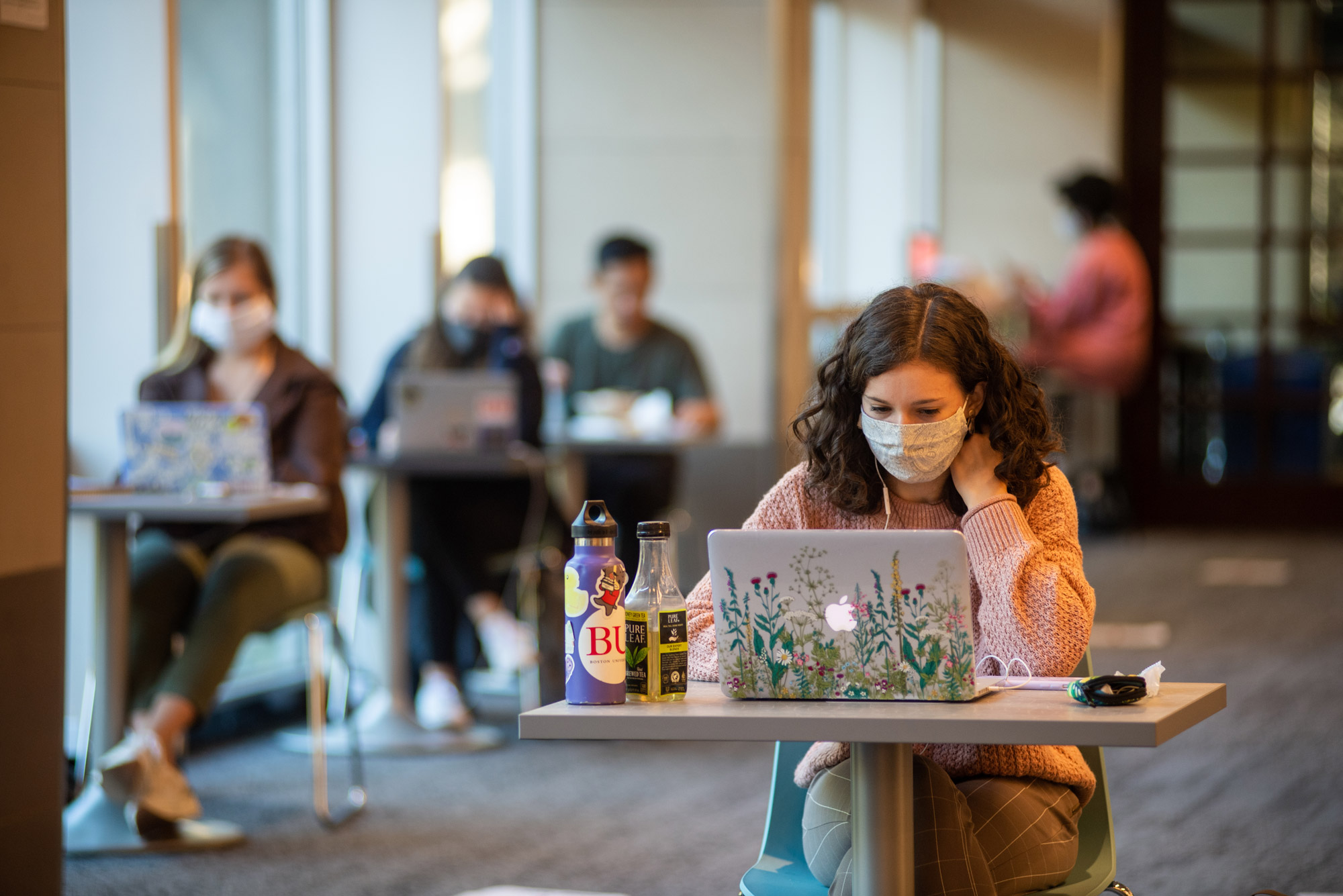COVID-19 Symptom-Free Badge Will Be Required for DIning Halls, GSU Entry after Uptick Last Week in Positive Cases among Students and Staff

An uptick in COVID-19 cases last week has prompted a University requirement to show a symptom attestation badge for entry to places like the GSU, where Blaire Smith (ENG’22) was studying last week. Photo by Cydney Scott
Rise in BU’s COVID-19 Cases Prompts Stricter Measures
Symptom-free badge will be required for dining halls, GSU entry starting October 22
- COVID-19 attestation badge will be required for entry into campus public spaces starting October 22
- Precaution follows a week of increased cases among students and staff
- Causes include more indoor and unprotected gatherings
Citing “a very worrisome increase” in daily COVID-19 cases among BU students and staff, University leaders will require all affiliates to show a green symptom attestation badge, starting Thursday, October 22, for entry into dining halls, the George Sherman Union, and other public spaces on campus.
Letters from BU’s leadership Tuesday commend the University community for keeping the campus coronavirus positivity rate so low early on in the fall semester, but said the recent uptick in the numbers requires a “recommitment” to ensure that campus life remains safe for students, faculty, and staff.
“We hope this will be a reminder to everyone of the importance of daily symptom attestation and testing for keeping our campus safe,” President Robert A. Brown and Kenneth Elmore (Wheelock’87), associate provost and dean of students, write in an email to students. “It is the responsibility of everyone in our community to minimize the spread of COVID-19.”
There are multiple reasons for the increase, says Judy Platt, director of Student Health Services. “We had a relatively low number of positives during the prior week and less people testing over the long holiday weekend of Columbus Day,” she says. “This past week, we conducted more tests.”
With cooler fall temperatures, “more groups are gathering indoors instead of outdoors,” she says, and risks of virus transmission increase indoors. Off-campus gatherings and even small gatherings in family homes are behind many of the cases from last week. Indoor gatherings that involve prolonged contact without mask use and sharing of food and drinks put people at risk. One off-campus gathering alone led to at least six cases, Platt says.
“Over the last seven days,” the email from Brown and Elmore says, “we have reported the largest number of new cases since the final week of Move-in in August.” For the week ending October 18, the University’s COVID-19 dashboard showed 20 students tested positive along with 10 nonfaculty staff (numbers are rounded off). No faculty tested positive during the week.
In a separate email to faculty and staff Tuesday, Jean Morrison, University provost, and Gary Nicksa, senior vice president for operations, encourage faculty to ask students to show their green badges as they enter classrooms. “Similarly,” they write, “we are asking managers of student-facing services to put into place a practice of asking students to show green badges when entering a department’s space. This practice has been successfully implemented in the Dean of Students Office, the Howard Thurman Center for Common Ground, and the Fitness and Recreation Center.
“We started the year with protocols in place to protect our in-person learning environment and for our being able to gather, safely, in the midst of this pandemic,” Nicksa and Morrison write. “For the common good, we resumed in-person operations with necessary restrictions to keep us safe. Let us recommit to a shared understanding of the critical importance of these protocols and restrictions so that we may care for each other and ourselves.”
Both letters implore students and staff to double down on anti-COVID precautions: to adhere to the University’s testing program and frequencies, to provide a daily symptom attestation if they fall in Categories 1, 2, or 3 per BU’s COVID protocols, and to “avoid gatherings in small, indoor spaces and adhere to physical distancing and wearing face coverings when with others, including in your student residence or off-campus apartment or home.”
“Although the number of cases per day is still relatively low,” Brown and Elmore write, “our concern is driven by the growing numbers of cases in Massachusetts and decreasing compliance with our community agreement and expectations for testing and daily symptom attestation for all students living both on and off campus.”
“The increase in numbers is concerning,” says Gloria Waters, vice president and associate provost for research. “We need to make sure that we do everything we can to ensure there is not an additional uptick. Most important of all is making sure everyone adheres to their testing protocol and the guidance about mask-wearing and social distancing.”
Even before the letters to students, faculty, and staff went out, some worried students took to social media to spread the alert and warn their peers after seeing the numbers on BU’s dashboard. A Questrom senior posted on BU’s Reddit page: “Daily cases are starting to go up. Please be smart!!! … We don’t want to go home again!!”
Surging infections in the United States, including an uptick in Massachusetts, are part of a global tide that hit 40 million cases this week. The trends have raised concerns about the need for more business lockdowns, something Massachusetts Governor Charlie Baker and many public health experts are resisting for the moment.

Comments & Discussion
Boston University moderates comments to facilitate an informed, substantive, civil conversation. Abusive, profane, self-promotional, misleading, incoherent or off-topic comments will be rejected. Moderators are staffed during regular business hours (EST) and can only accept comments written in English. Statistics or facts must include a citation or a link to the citation.